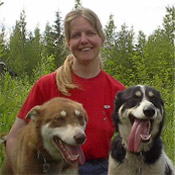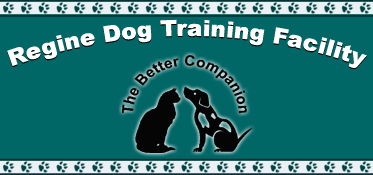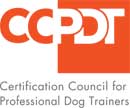Leading The Dance is designed as
a problem-solving tool. Some of the items will be used for the rest of the
dog's life - we particularly suggest the feeding regimen, possession, and
the roadwork. Other items will be done only until the dog understands his
position in society. When he graduates, release him from the items one at
a time over a period of several weeks, watching for him to go back to his
old ways. Many people do Leading The Dance one month in six as a preventative
measure. If there is any part of Leading The Dance that is liable to get
you bitten while you're doing it, DON'T DO IT and GET HELP from a competent
trainer!
1. Umbilical cord - As much as possible when you
are at home, keep the dog on leash and with you. Put a 6 foot leash on
the dog, and attach the other
end of the leash to a sturdy belt around your waist. Ignore the dog
and go about your business. Having to constantly watch what you do and
where you go
will not only bond the dog to you, but will help make you important
in his eyes.
2. Eye contact x 2 - twice a day, sit down with
the dog sitting between your knees, and use a command such as Watch Me,
or make funny noises,
or tap the
dog's nose and then your own, or whatever you have to do to get eye
contact.
3. Obedience x 2 - Twice a day, run quickly through
an obedience session using whatever the dog knows how to do, Sit, Down,
Come,
Stay, Heel,
repeat as needed.
Train for a couple of minutes each session. Do NOT touch the dog
to praise him.
4. Feed x 2 - When food is left down for the dog
to eat ad lib, the dog owns the food. Ownership is what dominance is
all about,
so we
must take possession
of the food. Feed the dog twice a day, in a confined area such
as a crate or the bathroom. Use a Feeding Ritual. Ask him if
he's hungry,
ask him to help
find his dish, to help find the food, ask him again if he's hungry,
tell him to go to his area or get in his crate, give him the
food. As soon as he's finished,
or as soon as he turns away from his food, or if he doesn't begin
eating
immediately, take the dish away, throw away the food, and clean
the dish. If the dog is
not successful at eating (doesn't eat his whole meal), give him
half the regular amount at his next meal, until he is cleaning
the bottom
of the dish. A successful
meal means he gets more at his next meal, until he is eating
the amount that will keep him in optimum condition. The food must be
high-quality
and low-bulk.
Water should be freely available all day. Give no treats in the
food or by hand. Dogs love rituals and you are teaching his body
to get
ready to eat when
he hears the beginning of the ritual.
5. Possession is 9/10 of the Law - At least once
a day, handle the dog. Repeat the words These are my ears! This is my
paw!
This is
my muzzle! This is my
tail! as you handle him. If he fusses, go slower. It's important
that the dog has a positive experience - that he comes to see
that you will
be handling
him and it's of no concern to him. When he is completely relaxed
and accepts your ownership, say OK and release him. If your
dog will not
allow you to handle
him like this without getting angry or getting away, DO NOT
do this exercise. Do the rest of the exercises and use the clicker
to teach
the dog to allow
this handling later.
6. Long Down-Stay - Do one 30-minute Down-Stay every
day. You can watch TV but the dog must be in plain sight and you must
be aware
of him.
He can roll
over, go to sleep, and look annoyed or bored, but he cannot
get up or walk away.
7. I'm-The-Mommy Down - At least once a day, just
because you felt like it, tell the dog to lie down. When he does,
use your
voice
only to tell him he
did a good job, say Okay, and walk away.
8. Bosshood Is In The Eye Of The Beholder - Consider
life from the dog's point of view. He sleeps where he wants,
he eats
when he wants,
he leads you around.
Any wonder he gets the impression that he's the Boss?
Don't allow him to go through doors ahead of you. Don't allow
him to go up
or down
stairs ahead of
you. Don't allow him to lead you down hallways. Always
position him or yourself so you are leading and he is
following. If
he's lying
down, don't walk around
him. Put your feet on the floor and shuffle right through
him (note you don't kick the dog, merely push him gently
out of
the way)
- make him think about
where you are and what you're doing. When he orders you
to let him out, take charge of going outside. Build a
ritual around the door.
Focus his attention
on you: Do you want to go out? Sit! When he sits, you
go to the
door. Want to go out? Sit. Down. Sit. Stay. Then open
the door and order
him out: Okay,
go outside! You change the situation so you are in charge
of it. Keep the dog on the floor. Not on the couch, not
on
the
chair, not halfway
up the stairs
surveying his domain, not in your lap, not on the car
seat. On the floor. Don't leave the dog loose in the house or
yard when
you're
not home. Free run of
the house when the Boss isn't home allows the dog to
feel powerful and in charge. Don't allow the dog to sleep on
your bed, or
on a child's bed. Dogs recognize
the bed as a throne for the Boss. If he sleeps away from
you, however,
he will think that you own the bedroom, but he owns the
rest of the house. The dog
should sleep in your bedroom. If you can't have him sleeping
in your bedroom (allergies, for instance), confine him
to his crate.
9. Work Off Energy - Roadwork the dog 4 days a week.
Start small, but work up to a mile for small dogs,
2 miles for
medium dogs,
and 3 miles
for large
dogs. Many problems will disappear with no more effort
than road working. You can jog with the dog, or ride
a bike, or
lunge him
with a Flexi
lead, or use
an ATV, or lend him to a jogger who's afraid of being
mugged.
10. Busy Hands Are Happy Hands - If you want to
pet the dog, he must first do pushups - Sit, Down, Sit,
Down,
Sit, Down,
Sit, Down
- then
you can pet
him for a count of 5 only. He never gets petted because
he wants to be or because he demands it, only because
you want
to and
he earns it. Then you pet him for
only a moment, and turn away with him wanting more.
11. My Game, My Rules - Give the dog only one toy.
If he wants to chase the toy, bring it to you and
let you
have
it, throw
it again.
If he
won't chase
it, or won't give it to you, turn your back and
walk away. He has two choices, he can play with you and
the toy, or
he can
play with
the
toy alone. Do not,
under any circumstances, play tug-of-war. When
you can get the toy without chasing him or playing tug,
pick
it up and
put it
away.
12. Eliminate Hormones - Have problem dogs neutered.
Some problems will solve themselves with no more
effort than
this. Not only
will the dog be healthier
and easier to live with, but your life will be
made simpler.
Susan Finlay Ailsby, Tue, 31 Mar 1998 20:12:11
-0600 (CST)
used with permission







